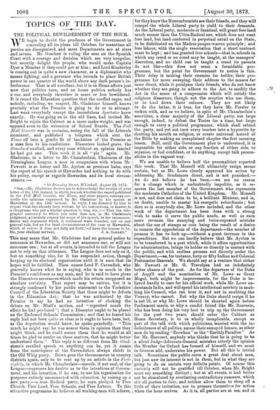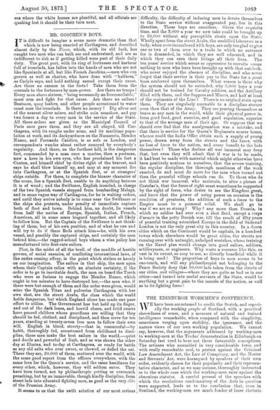TOPICS OF THE DAY.
THE POLITICAL BEWILDERMENT OF THE HOUR.
AVE begin to doubt the prudence of the Government in concealing all its plans till October, for meantime all parties are disorganised, and most Departments are at sixes and sevens. Mr. Goschen is ruling the seas on the Spanish Coast with a courage and decision which are very irregular, but secretly delight the people, who would make Captain Dyer a Member if they could get at him ; and Lord Kimberley is coming out in quite a new character, as a diplomatist who means fighting, and a governor who intends to place British power in one quarter of the world above any dark person's in- terference. That is all excellent, but it is on Home affairs just now that politics turn, and on home politics nobody has a cue, and everybody therefore is more or less bewildered. It is round the Education question that the conflict rages, and nobody, including, we suspect, Mr. Gladstone himself, knows precisely what the Premier is going to do or to attempt. Last week everybody except the incredulous Spectator knew exactly. He was going on in the old lines, had invited Mr. Bright to rejoin the Cabinet as a mere make-weight, and was opposed even to the extension of School Boards. The Pall Mall Gazette was in ecstasies, seeing the fall of the Liberals imminent, and published a telegram which sent the Times off into a gentle fit of laudation of the Premier as a man firm to his resolutions. Dissenters looked grave, the Standard exulted, and every man without an opinion fancied he had got one. This week it is all " pie " again. Mr. Gladstone, in a letter to Mr. Chamberlain, Chairman of the Birmingham League, a man in comparison with whom Mr. Fawcett is as honey and Mr. Ayrton as precious balm, says the report of his speech at Hawarden had nothing to do with his policy, except as regards Hawarden and its local circum- stances :— "to Downing Street, Whitehall, August 22, 1873.
"SIR,-Mr. Gladstone desires me to acknowledge the receipt of your letter of the 17th instant, in which you ask whether the report published in the Pall Mall Gazette, the Times, and other papers, conveys cor- rectly the opinions expressed by Mr. Gladstone in his speech at Hawarden on the 15th instant. In reply, I am directed by him to repeat what has already been written by his instructions, in answer to a clergyman who put a similar question to him, viz. :—' That the tele- graphic summary to which you refer does not, in Mr. Gladatone's judgment, accurately convey the scope of his speech, as the recommen- dation and argument which it contained were founded, not on any general rule, but on the local circumstances of the case at Hawarden, which of course it does not fully set forth.'—I have the honour to be, Sir, your obedient servant, J. A. GODLEY."
This may mean that Mr. Gladstone had no general policy to announce at Hawarden, or did not announce one, or will not announce one ; but at all events, is intended to tell the League not to rely on that utterance. The League does not rely on it, but on something else, for it has suspended action, though keeping up its electoral organisation until it is sure that its hopes will be fulfilled. Then comes Lord F. Cavendish, who generally knows what he is saying, who is as much in the Premier's confidence as any man, and he is said to have given the Dissenters assurances which made his return unopposed an absolute certainty. That report may be untrue, but it is strongly confirmed by his public statement to the Yorkshire Council of the Liberation Society that there might be defects in the Education Act ; that he was authorised by the Premier to say he had no intention of choking the debate on Mr. Miall's motion, and "regretted much the effect he had produced "; that a Dissenter ought to be placed on the Endowed Schools' Commission ; and that he feared his reply had not been quite as clear as it ought to have been, bat, as the deputation would know, he spoke guardedly. "This much he might say, he was nearer them in opinion than they might think, and he could assure them that he would at all times be glad to confer on these matters, that he might better understand them." This reply is as different from Mr. Glad- stone's recalled speech as anything can be, yet it comes from the mouthpiece of the Cavendishes, always chiefs in the Old Whig party. Down goes the thermometer in country districts again, only to be sent up by an article in the Fort- rightly, in which Mr. Chamberlain—mouth, if not soul, of the League—expresses his doubts as to the intentions of Govern- ment, and his intention, if he can, to use his organisation for purposes entirely unconnected with education, by raising up a new party,—a true Radical party, he says, pledged to Free Church, Free Land, Free Schools, and Free Labour. To this attractive programme he believes all working-men will adhere,
for they know the Nonconformists are their friends, and they will compel the whole Liberal party to yield to their demands. As the Liberal party, moderate or fanatical, will grant free land much sooner than the Ultra-Radical one, which does not want free land, but land conferred in perpetual entail on the State,. to be distributed on the Madras pauper-warren principle ; and free labour, with the single reservation that a short contract. must be kept ; and has granted free schools—that is, schools in which any creed or no creed may be taught, at the managers' discretion, and no child can be taught a creed its parents. do not like—this does not seem a formidable pro- gramme, but the point for Government to notice is this. Their delay is making their enemies far bolder, their pro- gramme far more sweeping, their address to the masses far more direct, while it paralyses their friends, who do not know whether they are going to adhere to the Act, to modify the- Act in the sense of a compromise which will satisfy the religious dissenters, though not the sceptics who use them,.
or to haul down their colours. They are not likely to do the latter, it is true, for they have Mr. Forster to- reckon with, and as we believe, in spite of Mr. Chamberlain's- assertions, a clear majority of the Liberal party, not large enough, indeed, to defeat the Tories for a time, but large- enough to carry a political programme, which shall rebind the party, and yet not turn every teacher into a hypocrite by shutting his mouth on religion, or create universal hatred of" the Bible by making an unexplained chapter the first morning lesson. Still, until the Government plan is understood, it is- impossible for either side, or any fraction of either side, to. organise, or feel confident, or do anything, except talk person- alities in the vaguest way.
We are unable to believe half the personalities reported this week. That Mr. Monsell will ultimately resign seems- certain, but as Mr. Lowe clearly approved his action by addressing Mr. Scudamore direct, and is not punished,— we do not believe he has been,—we see no reason for a change which is undoubtedly impolitic, as it re- moves the last member of the Government who represents. the moderate Catholics of the United Kingdom. Mr. Monsell is not, and does not claim to be, a brilliant Minister, and is,. no doubt, unable to master his energetic subordinate ; but. then so is everybody else, Mr. Lowe included, and the other- work of the department has been done with a strong wish to make it serve the public needs, as well as earn more revenue, the annoying and twice-repeated mistake about the use of stamps as coin being the result of a desire to remove the opprobrium of the department—the number of persons it has to lock up—without a great increase in the expenditure. But we can hardly believe that Mr. Ayrton is to be transferred to a post which, while it offers opportunities. for administration, brings its holder so directly in contact witb. the public, and with endless persons not directly under the Department,—as, for instance, forty or fifty Indian and Colonial Postmaster-Generals. We should say at a venture that either. Mr. Fawcett or Mr. G. Trevelyan had an indefinitely better chance of the post. As for the departure of the Duke of Argyll and the nomination of Mr. Lowe as Great Mogul, both might be improvements, for the Duke is be- lieved hardly to care for his official work, while Mr. Lowe un- derstands India, and will spend his intellectual acerbity in snub- bing his Council, who can bear it, and not in snubbing the Viceroy, who cannot. But why the Duke should resign if ha- ils not ill, or why Mr. Lowe should be shunted again before Parliament meets, or why a candid friend like Mr. Bouverie, who has been doing his very best to trip up the Government for the past two years, should enter the Cabinet as Home Secretary, is to us wholly inexplicable, except as part of the talk with which politicians, worried with the in- definiteness of all politics, amuse their ennuyed leisure, as other men do by reading "Erewhon" or the "Earthly Paradise." As for Mr. Harcourt, anybody who thinks that he is going to be a silent Judge-Advocate-General mistakes utterly the opinion the Member for Oxford has formed of himself, and we must in fairness add, underrates his power. But all this is trivial talk. Sometimes the public cares a great deal about men, but just now its interest is not in them, but in what they are going to do on certain very definite points. Of course this curiosity will not be gratified till October, when Mr. Bright must say something distinct ; but at all events, it had better not be stimulated by everlasting contradictory rumours, which stir all parties to fury, and neither allow them to sleep off a little of their irritation, nor to prepare themselves for action when the hour arrives. As it is, all parties are at sea, and at
• eea where the white horses are plentiful, and all officials are quaking lest it should be their turn next.































 Previous page
Previous page